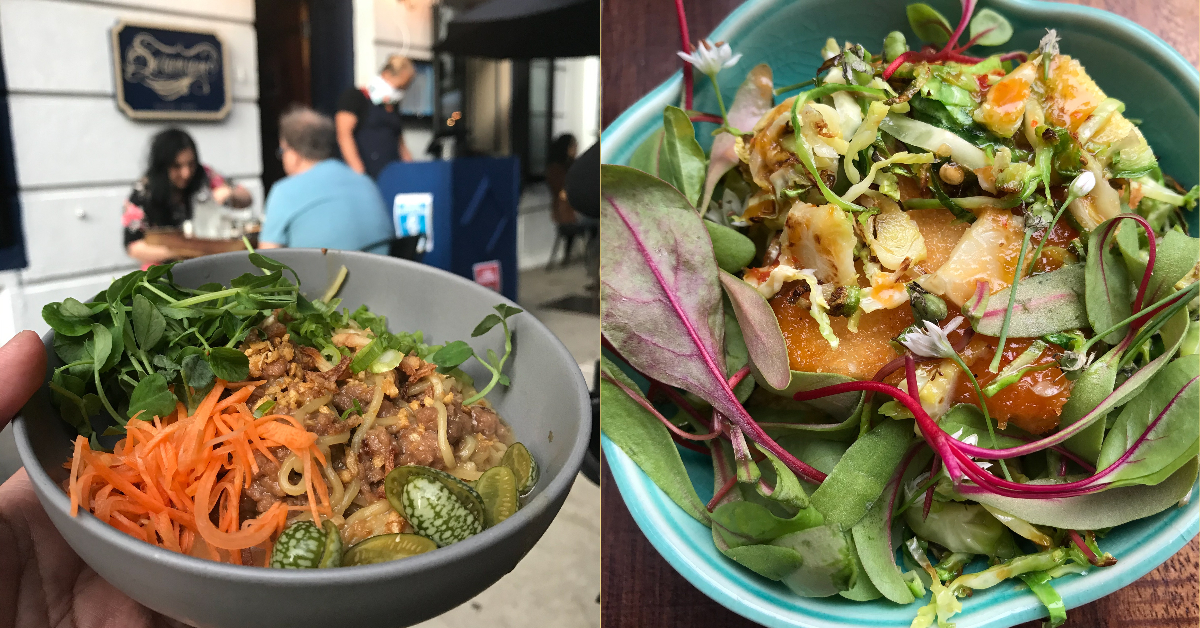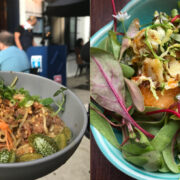
WHEN his boss Ravi DeRossi told chef Raj Abat last September to come up with an idea for a Filipino vegan restaurant, he was a little hesitant.
Growing up in La Union, Philippines, he knew for a fact that Filipinos love and adore their meats and seafood.
He took it as a challenge though and began to think of his favorite dishes and how he’d be able to make them vegan. He told his mom who echoed his initial one-word response to DeRossi: impossible. The restaurateur was insistent and he told Abat to just have fun and do it.
And that’s exactly what he did.
A couple of months ago, he made a test run and cooked vegan Filipino dishes based on what he thought would work.
“Nakita ko, meron siyang kaluluwa. The taste is there, posible pala siya. Puwede, so we went for it,” he told the Asian Journal.
A week ago, they informally opened the doors of the new place and they called it Saramsam, a nod to chef Raj’s Ilocano roots.

Abat’s family moved to New York when he was about 10 years old. He grew up in the Spanish Harlem area in upper Manhattan.
Among his first steps was to find a substitute for some of the ingredients integral to the dishes he wanted to serve, like bagoong, which is a staple for pinakbet and kare kare. He thought of fermenting black beans in-house and conducted a few experiments. His taste test confirmed his theory, the fermented beans can be used instead of bagoong.
The beans bagoong is used in a couple of dishes on the menu: an appetizer called Kamatis Bagoong and one of the main dishes, Kare Kare. We had both and indeed, the funkiness of the fermented beans gave the dishes a similar flavor.
We first met Abat (whose full name is Raja Dakila) in 2015. He was then executive chef at Joseph Leonard, a small, casual place in The Village where he added Filipino dishes to the restaurant’s late-night menu. From midnight to closing, the restaurant served Filipino fare like balut, arroz caldo, pulled pork sandwich and beef mami, under the menu heading ‘Midnight in Manila.’
Chef Raj said he knows what Ilocano cooking is by heart but he claims he is no expert. He knows that he won’t be able to copy or replicate the dishes, so he did the next best thing: to copy the way Ilocanos cook.
That means going to the market every morning to buy the freshest produce.
Armed with his backpack and scooter, Abat goes to the Farmer’s Market in Union Square to get fruits and vegetables. He also makes quick trips to Chinatown for the bitter melon and string beans, and other products not found in the farmers’ markets.
“That was my idea of the Filipinos way of cooking and that’s what we’re trying to do here at Saramsam. Take the Ilocano philosophy and make it Filipino somehow and yet very New York,” he said.
Typically, restaurants have big purveyors for their supplies and ingredients for ease and convenience but Abat decided to go the other way.
“I really want to push that boundary of not being so comfortable. Gusto kong mamalengke and I want to be creative with whatever I get from there,” he added.

Creative, soulful food
More people know more about Filipino cuisine now but most of them don’t realize that it is diverse and regional.
“I am not by any means a master of Filipino food, or Ilocano food for that matter. It’s not even Ilocano food pero yung puso at kaluluwa niya, definitely Ilocano,” Raz reiterated.
What he has to offer is another option: Filipino food that is more vegetable-forward, yet creative and bursting with Filipino flavors.
Their overall vision is a table filled with various plates and with a magnum of wine or beer and friends and family in a conversation and having a great time.
Chef Raj, who gained his chops working in France and Indonesia, shared that he is also experimenting on vegan versions of dinuguan, and for brunch, tocino, torta and longganisa.
When he returned to New York, he worked with famous celebrity chefs including Jean-Georges and David Bouley and restaurants such as Brooklyn’s Saul and the Market Table. Prior to his move to DeRossi’s group last year, Abat was at the now-shuttered Bar Sardine.
Saramsam is part of DeRossi’s Overthrow Hospitality Group, a Manhattan-based family of vegetable-forward bars and restaurants which includes Ladybird, Avant Garden, Proletariat and Amor y Amargo. DeRossi also started Death & Company, The Bourgeois Pig and Mayahuel.
Simple Menu
For now, Saramsam has about a dozen dishes on the menu. They recommend multiple plates to reflect the meaning of their name in Ilocano, which means casual dining or snacking.
The traditional ones are there, from adobo to sinigang to sisig.

“I believe sisig can make or break any amazing Filipino restaurant. For our version, we use waygu and so far, we’re the only one in the New York and New Jersey area using it,” he revealed, sharing a story about its origins.
He said there was a blind tasting among Japanese chefs which involved teriyaki strips where nine out of 10 were actual beef and one was a plant-based protein called “waygu.” In the end, the textured soy protein alternative ended up as the second-best among the chefs and has become a plant-based alternative to the famed “wagyu” beef.
His version of sinigang (root vegetables are the star) is cooked with fresh tamarind and orange wine and the adobo using roasted mushrooms has pinot noir.
Raj also takes pride in their extensive and well-curated wine list from Spain, Italy and California and craft beer list, which includes San Miguel Beer pale pilsen by the way. They even have Filipino cocktails creatively named: Saramsam Sunrise, Kabit Sling and Pinay Colada.
He said that the idea that Filipino dishes don’t do well with wine paring is just that, a theory and a misconception.
“At the end of the day, you have to flip the way you think, and see if the combination tastes good,” he said. We have the food, we have the wine list, beer and cocktails and that warm embrace na para kang dumadadating sa bahay ng lola mo.”
There’s one dessert and it’s halo halo, topped for now with vegan ice cream from Van Leeuwen, while they’re still perfecting their own ice cream flavors.
Opening in the pandemic
Abat and his team are excited that more and more people are now dining out.
“We’re very lucky we’re busy and I feel like there are many opportunities now,” Raj said when we asked about opening a business during the pandemic. “People will know and will come back if you’re good.”

They look forward to the gradual reopening of indoor dining in the city on September 30. With a capacity of around 40 people, they will be able to offer maybe around four tables inside, aside from the nine they have outdoor.
He is hoping to ride the Filipino food wave and with its location in the East Village, a Filipino food crawl in the neighborhood is possible.
Saramsam joins its neighbors including Jeepney, Mama Fina’s and a little further downtown, Kabisera, Pig & Khao and Tsismis in the Lower East Side to satiate the burgeoning interest on Filipino cuisine and fill the vacuum particularly for those looking for vegan options.
Indeed, it’s not your lola or nanay’s pinakbet where everything is left in the pot to cook. And since people eat with their eyes first, Saramsam’s dishes are also eye candy and needless to say, Instagram and Pinterest friendly.
“What we serve are vegetable dishes with Filipino soul and heart and are plated with a lot of care, and a few garnishes,” he quipped.
And since he goes to the market daily, his ingredients will tend to change depending on the availability and seasonality of the vegetables.
“The way we cook pinakbet, sinigang or adobo will always be the same but the ingredients we include will vary depending on the season,” he said.
He is also ready to face who he calls “the hardest, toughest critics: Filipino moms and titas.”
His mom Zenaida went to the restaurant the day before we visited. She gave her son a thumbs-up.
“I kid you not, she doesn’t mince any words. Before, she told me it’s going to be impossible. After she ate, sinabi niya, ‘Anak, I’m sorry, mali ako’,” Raj shared.
Having said that, Raj shared that he is ready to face the Titas and listen to what they have to say after they eat at Saramsam.
“As chefs, we get criticized a lot so you got to have an open mind. Maybe the Tita has a point, right?” he said.
For the Titos and Titas then who have cholesterol and hypertension issues, pigging out at Saramsam could be a worthwhile experience.
“Sometimes when we eat out [at] Filipino restaurants and they order lechon kawali, they’d say ‘makapa high blood met,’ which roughly means the food makes their blood pressure shoot up. Not here, it’s all vegetables,” he said laughing.






